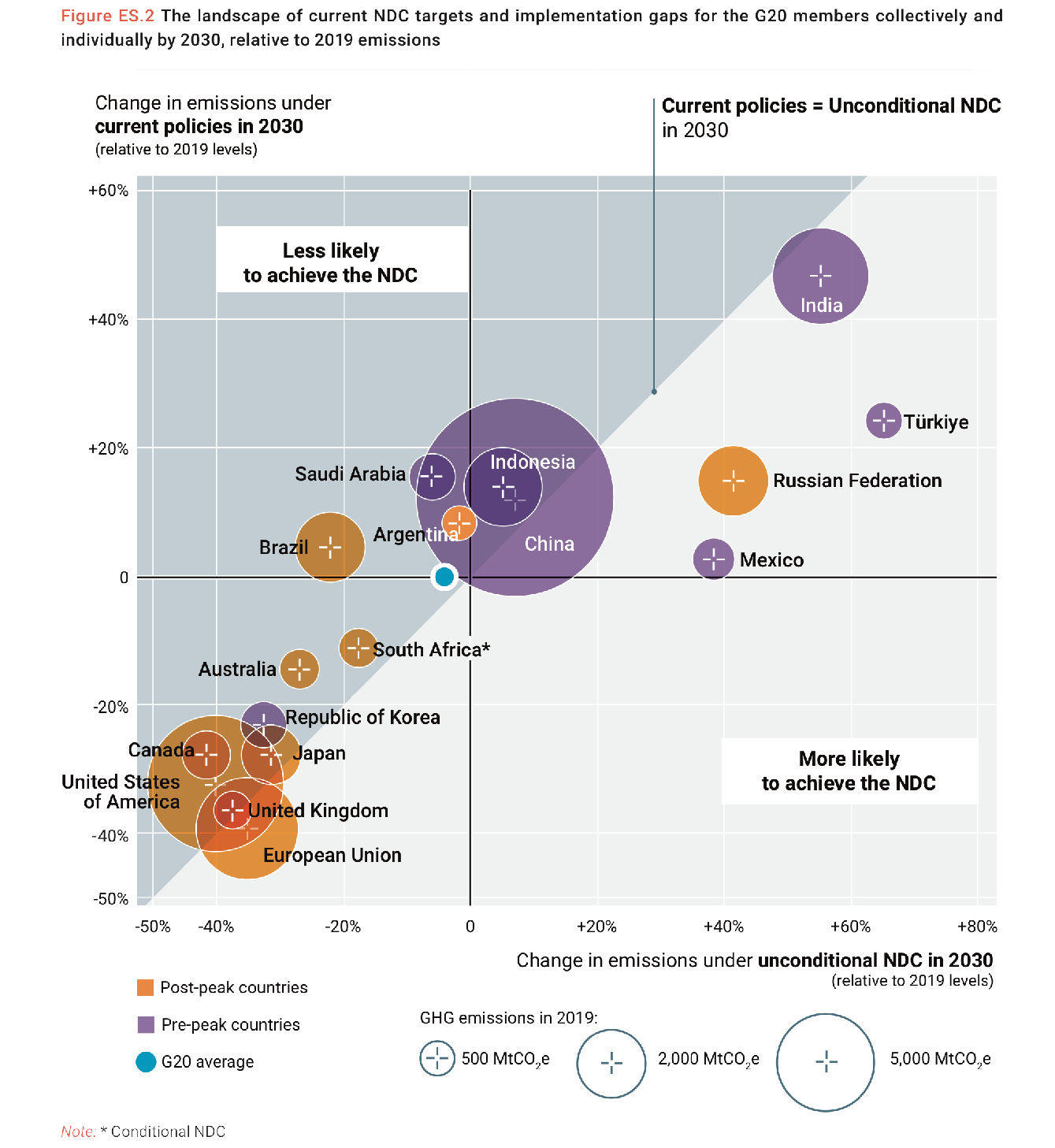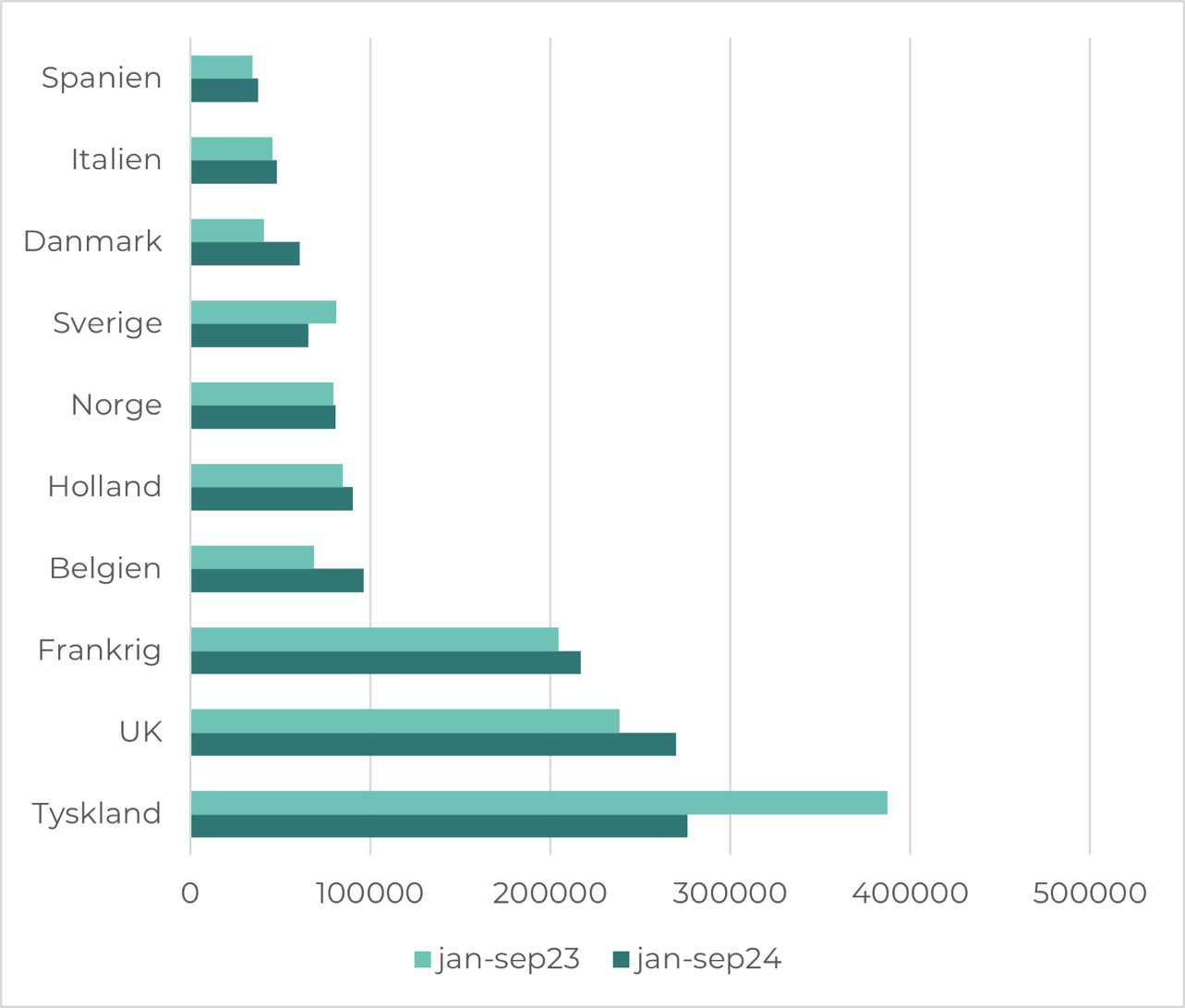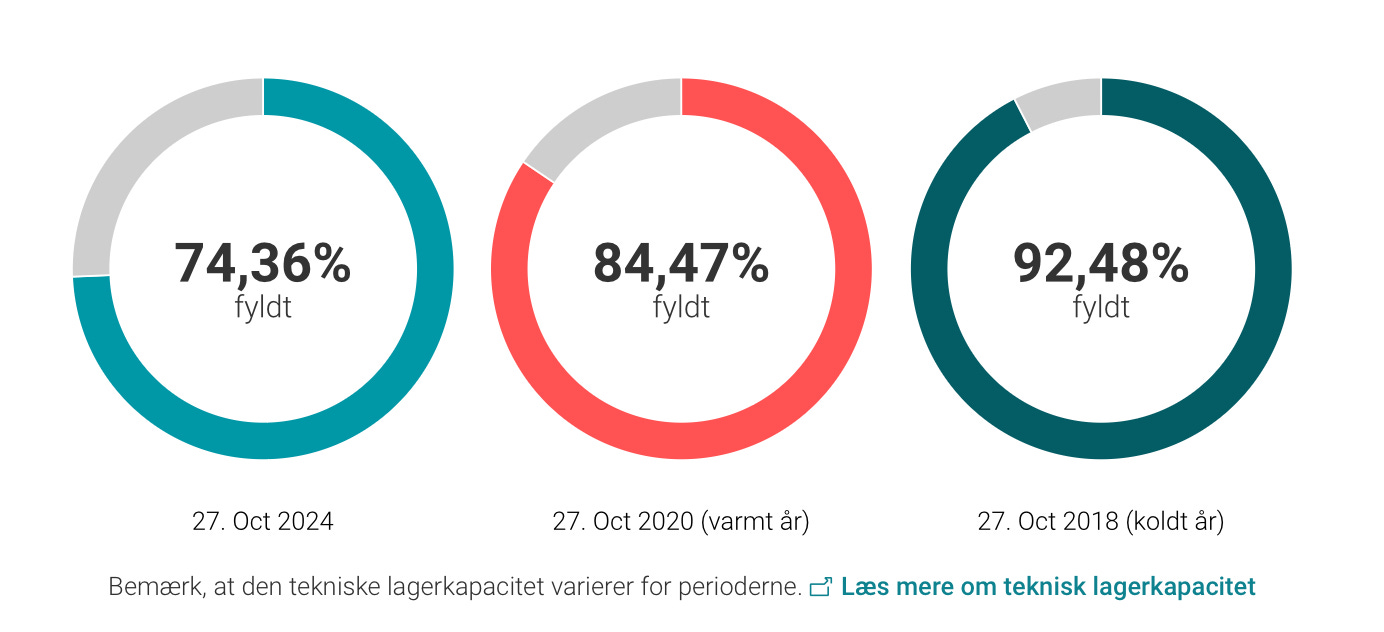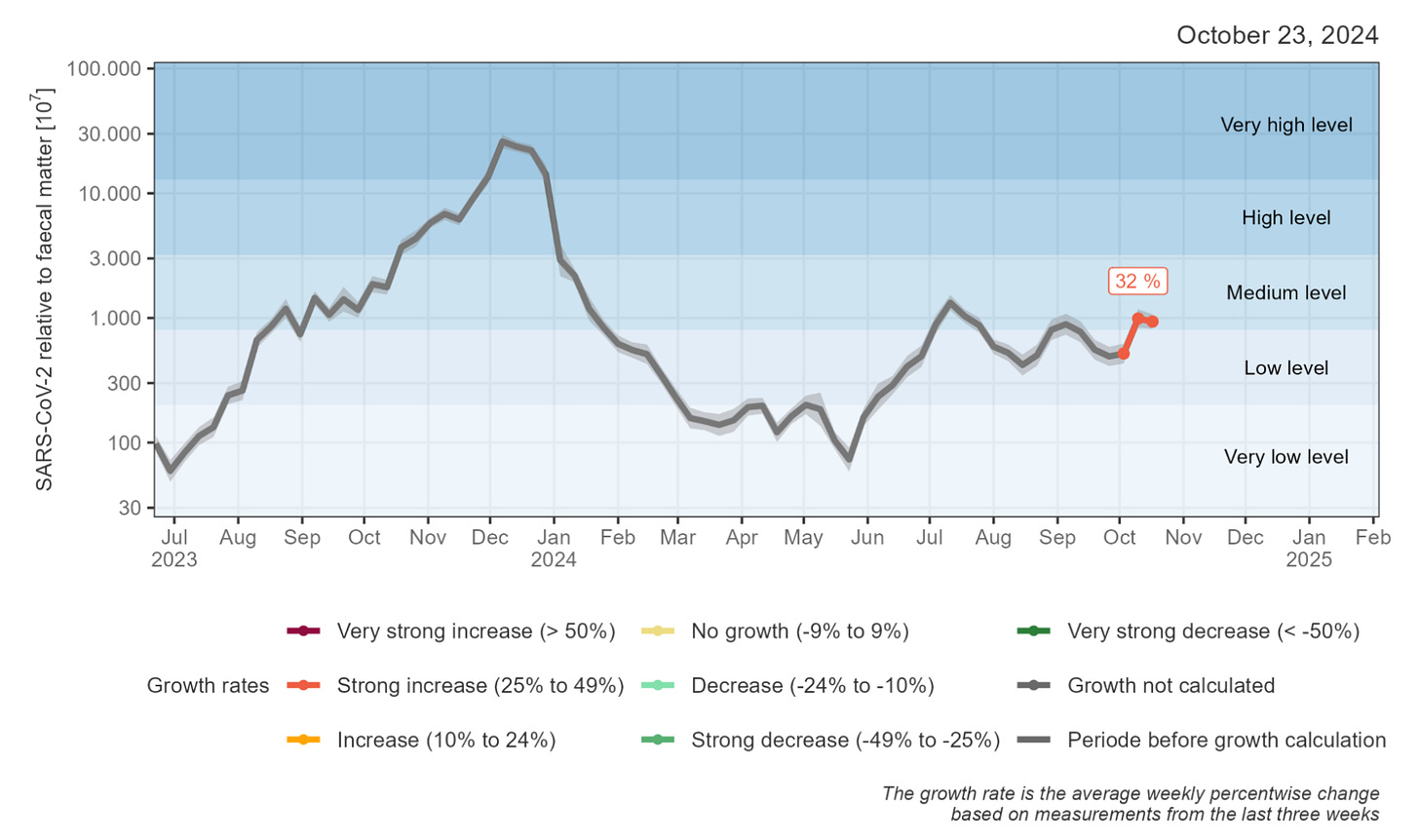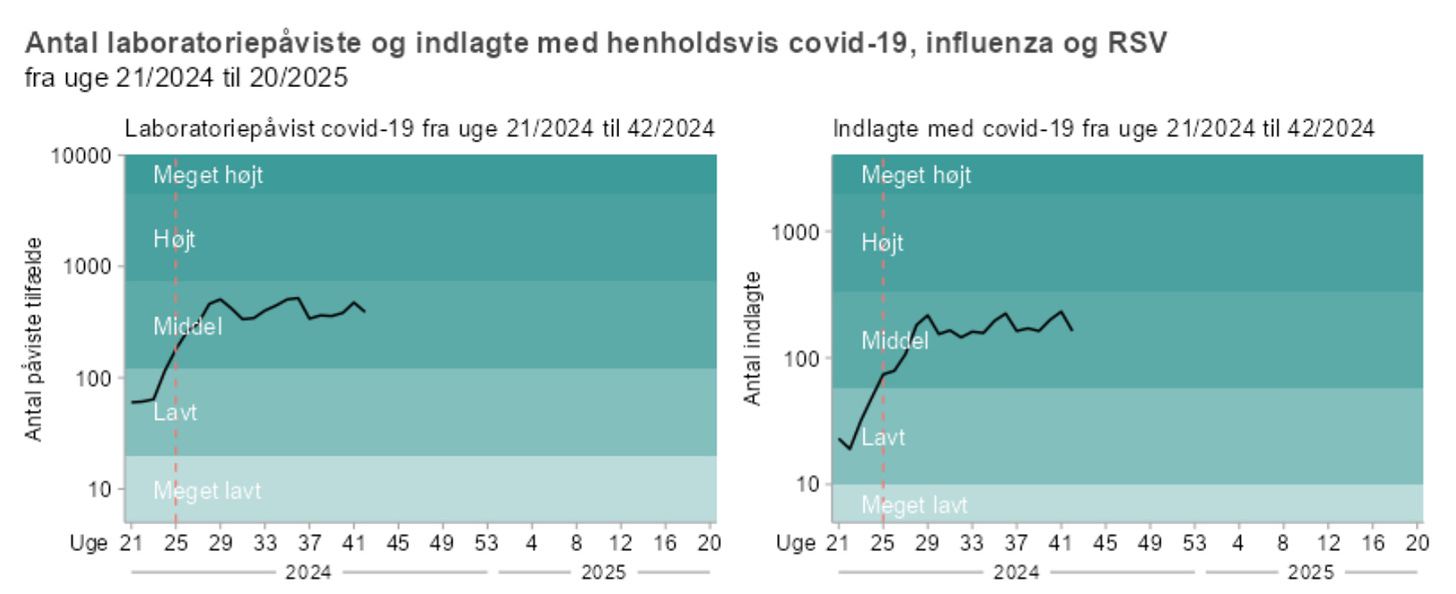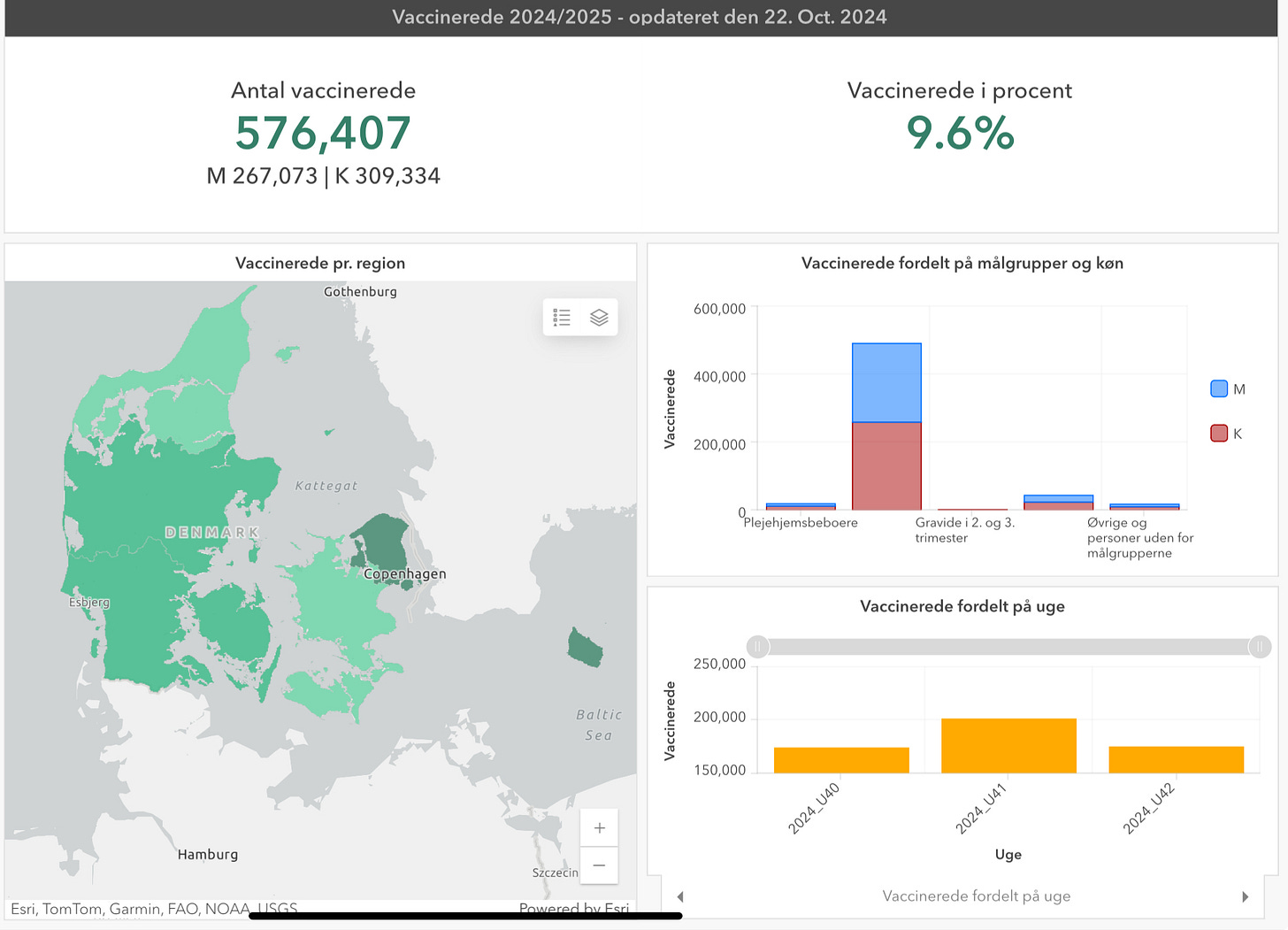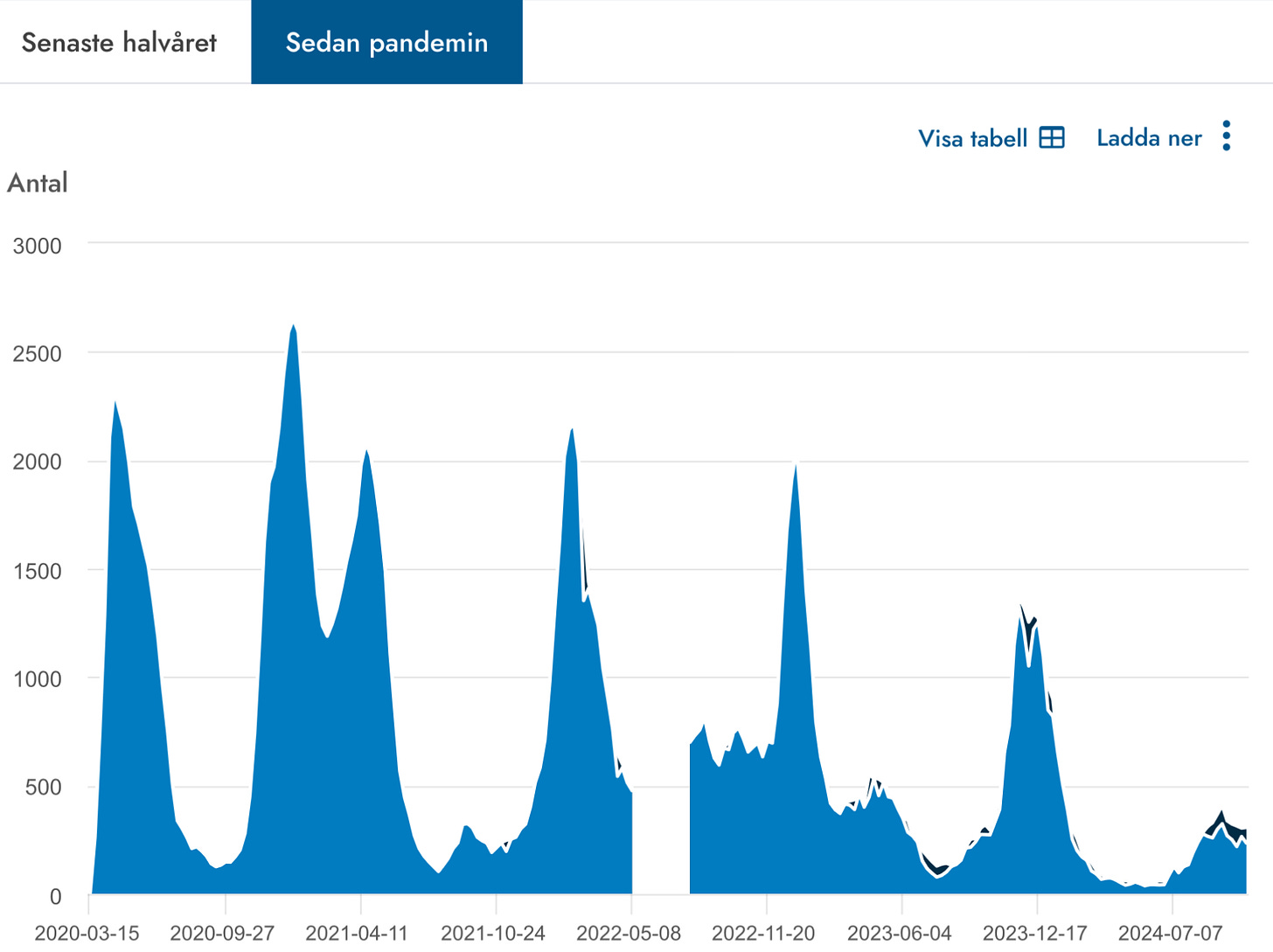Monday Morning News & Notes
World MIA on emissions reductions. Bots manipulated COVID discussions.
🍃Environment & Energy⚡️
🌍
The world is way off target in efforts to limit global warming to 1.5°C. That is according to the latest report from the UN Environment Programme, which paints a dismal picture forecasting global temperatures to increase by 2.8°C. The report concludes that the current increase in global temperatures will have “a debilitating effect” on the planet, the world’s economies, and on us as people.
In order to limit global warming to 1.5°C, the report says global emissions must be reduced by 42% by 2030. However, we are doing the exact opposite. In 2023, we emitted the most greenhouse gases on record, while 2023 also went into the record books as the hottest year ever.
According to the report, the world has to cut greenhouse gas emissions by 7.5% every year from now until 2035 in order to limit global warming to 1.5°C. To put that into context, that is equal to the emissions reductions seen in 2020 during the COVID pandemic, when the world essentially shut down. We would have to do that every year for the next decade.
The Danish Meteorological Institute called the report “concerning.”
DMI Head of the National Centre for Climate Research Adrian Lema:
“We have already experienced the consequences of a warmer world, for example with more cloudbursts and storm surges in Denmark and in other countries. And what we can look forward to is even more droughts, floods, and severe weather events. They will only get stronger and more frequent. We must have a reduction curve, which must break very steeply. And that's where we have to start right here and now.”
According to the report, there is "a technical" chance of keeping the global warming increase at 1.5 degrees, but this requires an immediate and massive worldwide effort.
🇩🇰
A new Danish study has focused on a better understanding of the environmental consequences of disturbing the ocean floor. The study simulated disturbances on the ocean floor in a laboratory setting to better understand the impacts on CO2 emissions. The ocean floor can be disturbed by activities like bottom trawling and the excavation and extraction of raw minerals.
Aarhus University Department of Ecoscience Senior Researcher Christian Lønborg told DR we know “frighteningly little” about how things like bottom trawling, the dragging of nets along the sea floor to catch fish and shellfish, affect the release of nitrogen and CO2 from the seabed.
“It's a bit of a 'black box' in some respects, that we don't really know what happens when we do things out in the sea. No one has said now we take some seabed somewhere, then we swirl it up a few times, and then we see what happens. It is a bit surprising that no one has done it before.”
The study showed that disturbing the seabed leads to a 14 times greater emission of carbon dioxide, which in turn leads to higher oxygen consumption than when the seafloor is left untouched. The study comes in the wake of a report this fall that showed Danish waters have suffered the worst loss of oxygen in more than two decades.
While the study determined disturbing the seafloor increases the release of nitrogen and greenhouse gases into the atmosphere, it does not quantify in what amounts.
“There is probably a large part of what is being moved into the atmosphere, but I cannot say exactly how much.”
It is worth noting that in Denmark, and likely other coastal countries, the emissions from seafloor disturbances are not calculated as part of national emissions data and thus are not included in efforts to reduce CO2 emissions.
-
After a year of severe weather events that have included historic flooding, Silkeborg Kommune has appointed a climate coordinator to ensure the municipality and homeowners are more prepared.
Technology and Environment Head Thomas Damsgaard:
“In the short term, we hope that the people feel better guided by the municipality and that in the long term they gain an understanding that they have a great responsibility to be better prepared and keep themselves safe and that they should probably start doing that now. Climate change is progressing faster than we expected.”
The municipality experienced a surge in flood damages and repairs last year due to some massive rainfall events that triggered flooding. The floodwaters forced some people from their homes. The new climate coordinator will be responsible for encouraging people to be proactive in preparing for severe weather events and ensure the municipality is able to respond as quickly as possible when they do happen.
Damsgaard recommends people living in flood prone areas work to make their homes as resistant to flooding as possible. In the event of severe rainfall, he recommends blocking cat doors, ventilation grates, and other ways water can access the house. In an emergency event, sandbags, which will be provided by the municipality, can also be utilized. Damsgaard also recommends homeowners acquire a pump so if their home is flooded they can begin pumping out the water as fast as possible.
Silkeborg is not alone; other communities around the country are also working to mitigate against severe weather events. In Kolding, the Kommune is holding flood protection workshops. Vejen Kommune is also doing something similar while also going directly to flood-impacted homes to work first-hand on mitigation efforts. Syddjurs is also holding a flood preparedness meeting and has set aside 800,000 Danish kroner (about $160,000 Cdn) to address climate adaptation work.
Denmark recorded the wettest year ever in 2023, with an unprecedented storm surge in October triggering widespread flooding events in towns and cities across the country. September of this year also set a new rainfall record as climate change continues to drive severe weather events. This has significantly increased the amount of severe weather damages and related insurance claims.
-
In the first year that special environmental zones were introduced in Denmark’s four biggest cities, some 17,059 tickets were issued to drivers of diesel cars prohibited from driving within those areas. That is according to the Danish Environmental Protection Agency. The fine for driving an older polluting diesel without the required particulate filter within the environmental zone is 1,500 Danish kroner (about $300 Cdn).
The environmental zone rules were introduced on October 1, 2023, in five municipalities - Copenhagen, Frederiksberg, Odense, Aarhus, and Aalborg - with the goal of improving air quality.
🇫🇮
Estimations of the ability of forests in Finland to act as a carbon sink have been much too overly optimistic, according to the Finnish Environment Institute. In 2022, the scales tipped with the amount of carbon being absorbed by forests coming in less than emissions from farming and other land use.
The institute recommends a significant reduction in logging if Finland is to meet its goal of becoming carbon neutral by 2035. Logging has increased since Finland stopped importing timber from Russia due to its invasion of Ukraine. That impacted both demand and timber prices.
The institute calculates that if Finland is to meet its carbon neutrality goals, then the net carbon sink for the land use sector should be around 21 million tonnes of CO2. Instead, in 2021-22, it was emitting about a million tonnes of greenhouse gases.
Senior Researcher Sampo Soimakallio says it is looking increasingly likely Finland will not meet its climate goals.
"Against this background, it is challenging, to say the least. If logging is not limited, it is starting to look nearly impossible to achieve unless something revolutionary is done in other emission sectors.”
The Finnish government has also reduced the amount of biofuel that fuel distributors are required to blend with gas and diesel, which will further push Finland’s climate goals out of reach.
🇪🇺🇩🇪
The big sales slump in Germany is dragging down European statistics on electric vehicle sales numbers. That is according to Dansk eMobilitet, who points out that while EV sales appear to have fallen by 5.8% across the EU so far this year, if you exclude Germany from the calculations, then European EV sales would actually show an increase of 6.5% year over year.
Chief Analyst Søren Jakobsen:
“Sales of electric cars in the 10 largest electric car markets in Europe have increased in 8 countries but decreased in Sweden and Germany. The negative stories about electric car sales in the EU are really about the decline in Germany, which is not surprising because subsidies fell sharply in 2024.”
🇩🇰 🇧🇪 🇳🇱 🇫🇷 🇩🇪 🇳🇴
At a summit of North Sea countries hosted by the Danish Minister for Climate, Energy, and Supply, Lars Aagaard, a series of recommendations were tabled to facilitate offshore wind energy. The Odense recommendations include new approaches to financing cross-border energy projects, interaction between offshore wind development, and green hydrogen production. They also propose reducing bureaucracy, improving financing, and increasing transparency.
"We need a strong, green Europe that can keep up with global competition. The workplaces of the future depend on it. One of the solutions is offshore wind, and fortunately we live right next to the North Sea, which has optimal conditions for an awful lot of wind energy. In order to be able to utilize that potential, we propose in the North Sea cooperation a number of concrete initiatives, which we are now placing in the hands of the future European Commission.”
One of the focuses of the summit was to improve cross-border cooperation on wind energy projects, removing obstacles and bureaucracy so that countries can more easily collaborate on wind energy projects.
🇩🇰 🇪🇺
Denmark will not meet its November 1 deadline to have its gas reserves at 90%.
Per the latest update from the Danish Energy Agency:
“Even if the supply is stable, it is no longer technically possible for Denmark to reach the goal of 90% full by November 1. However, this is not considered a problem for security of supply.”
The EU mandate for countries to have gas reserves of at least 90% is designed to provide a buffer against an energy crisis should temperatures plunge into the deep freeze.
As for the European Union, gas reserves are at 95.5% while LNG import terminals are 65.5% full.
🇸🇪
Cryptocurrency mining eats up just over 1% of Sweden’s national energy use, or, to look at it another way, uses enough electricity to power roughly 75,000 homes. Now two agencies, the Swedish Financial Supervisory Authority and the Swedish Environmental Protection Agency, want to see a ban on energy-intensive cryptocurrency mining. Specifically, a ban on older technologies that are much less energy efficient.
Financial Supervisory Authority Senior Coordinator Klas Malmén:
“We have previously warned about cryptocurrencies when it comes to consumer risks and that it is used in criminal contexts. We see that the Swedish Tax Agency has problems with tax evasion. But it is not the function of cryptoassets that we want to ban, but the first-generation blockchain technology because it is so energy inefficient.”
The two biggest cryptocurrencies are Bitcoin and Ethereum. The method of mining for Bitcoin requires a lot of computing power and thus a lot of energy. The more Bitcoin mined, the more computing power is needed and the more energy is used. Globally, Bitcoin mining uses roughly 160 terrawatts of energy a year. That is about equal to the energy usage of Poland.
Ethereum, on the other hand, uses a different method to mine cryptocurrency, which uses about 99.5% less electricity. Globally, it uses up just 5.6 gigawatts of energy a year.
🦠Outbreaks🦠
🇩🇰
COVID activity across Denmark as measured by wastewater surveillance ebbed a little week to week, but the national growth rate average over the last three weeks is registering as a “strong increase,” according to the Statens Serum Institute.
Both the number of confirmed coronavirus infections and infection-related hospitalizations declined in the latest weekly snapshot.
However, influenza-related hospital admissions have increased as we begin to approach the time of year when flu season swings into gear.
-
Since the fall vaccination campaign began across Denmark on October 1, more than half a million people have had a COVID vaccine booster dose. The vaccination rate among vulnerable seniors is 40%, and among seniors in care it is 49%.
-
Shades of the opioid crisis that has killed thousands of people in North America has reared its head in Denmark. Politicians are debating whether to include opioids in wastewater surveillance in Denmark’s six biggest cities as opioid deaths increase. Those for the idea say it will give a better sense if opioid use is increasing in a specific area of a city with measures then being taken to combat the problem. Those against, including Health Minister Sophie Løhde say the picture would be inaccurate given that opioids can be prescribed and consumed legally.
The proposal will be decided in the parliament today. The government is also increasing access to naloxone nasal spray to be used in the event of an opioid-related overdose.
🇸🇪
In Sweden, COVID hospitalizations (307) have crept upward (+3) while the number of severely infected people requiring intensive care (4) has dropped (-7).
🇫🇮
A unique study from Finland shows how malicious bots used social media during the COVID pandemic to spread disinformation and undermine trust in vaccines. The study, a joint effort between the Finnish Institute of Health and Aalta University, analyzed Finnish language social media posts on X (Twitter) over three years and found that 22% of the pandemic conversation on X was being manufactured by bots, programs imitating human users. Of the identified bot accounts, 36% were acting maliciously by spreading misinformation. About a quarter of all messages contained misinformation, and the same number were sowing distrust in vaccines.
Researchers found that the bots were piggybacked on Health Institute social media posts to spread misleading information. Another way they increased their exposure was to mention other accounts in their posts, something that happened in 94% of all tweets.
Specialist Researcher Ali Unlu:
"The results show that bots of all kinds often work simultaneously with official communication and thus increase their own reliability and effectiveness. Instead, malicious bots use more aggressive and deceptive methods and can thus amplify erroneous messages, shape citizens' opinions, and cause confusion by making it difficult to identify reliable sources of information from unreliable ones.”
According to the study, bots may weaken trust in healthcare providers in the long term. Therefore, it is important to develop increasingly effective tools for identifying and mitigating the effects of bots.
Lead Expert Tuukka Tammi says public health agencies need to have strategies to deal with bot activity on social media. The study suggests better training and awareness on identifying bots, understanding their operations, and on tools used to identify them.
"The study also calls for more actions from social media platforms to curb clearly false information and transparency. In this way, citizens' trust can be significantly improved, and communication efforts aimed at increasing public health can be made more effective.”
🇳🇴
An mpox infection has also been confirmed in Norway’s capital, according to a release from Oslo municipality. However, health authorities have confirmed it is a Clade II variant infection, the one behind the 2022 outbreak, and not the more infectious Clade I strain behind the current outbreak in the Democratic Republic of Congo and neighbouring African countries.
Infection Control Supervisor Fredrik Rønning Iversen:
“The infection case is being handled by Oslo municipality with a follow-up of the infected person, infection tracing, and informing any close contacts.”
Norwegian health authorities have already been busy vaccinating those eligible with the mpox vaccine.
🇩🇪
Germany has confirmed the first case of the new, more infectious mpox variant. According to the Robert Koch Institute, the Clade I infection involved someone who was travelling abroad.
This is the second case confirmed in Europe after another Clade 1 mpox infection was confirmed in Sweden months ago. That case was also travel-related.
🇺🇦Ukraine/ Russia War🇷🇺
🇺🇦/ 🇰🇵🇷🇺
Ukrainian military intelligence is claiming that North Korean troops have been deployed on the front lines to help the Russians fight in the Kursk region. That is the Russian region currently under Ukrainian control.
🇺🇸/ 🇰🇵🇷🇺
The United States has now confirmed that North Korean troops are in fact in Russia. U.S. Secretary of Defense Lloyd Austin told the Washington Post that the government has proof North Korean soldiers were dispatched to Russia. However, he added that the purpose of why they were sent is not yet clear.
“We now have evidence that there are North Korean soldiers who have entered Russia. What they do exactly, we have to wait and see. But yes, there is evidence that there are North Korean soldiers in Russia.”
🇪🇺 🇺🇦
The European Union and G7 countries have agreed to issue a €45 billion loan to Ukraine covered by the interest on Russian funds that have been frozen due to its illegal invasion. The EU will cover €18 billion of the loan, with the United States, Canada, the UK, and Japan covering the rest. Payments to Ukraine will begin on December 1 and will continue until the end of 2027.
EU Parliament President Roberta Metsola:
“We are sending a signal that Russia, as the aggressor, is going to pay for the destruction it has caused.”
Ukrainian Prime Minister Denys Shmyhal welcomed the financial support.
“It will help solve Ukraine's urgent financing needs.”
The money will be used by Ukraine to strengthen its struggling economy, increase and strengthen its military, as well as for the reconstruction of the war-ravaged country.
🇺🇳/ 🇺🇦
UN Secretary-General António Guterres showed up at last week’s BRICS summit in Kazan, Russia, where he met with, among others, Russian President Vladimir Putin. While he called out Russia for its invasion of Ukraine during the meeting, he was also lectured by Putin in return.
Ukraine is not happy with Guterres for showing up at the BRICS meeting and being chummy with Russian President Vladimir Putin and Belarusian dictator Alexander Lukashenko. Guterres asked to visit Ukraine immediately after the BRICS meeting; however, Ukraine rebuffed the offer with a big no thank you, according to sources cited by AFP.
🇹🇷
Turkey continues to walk a fine line between western nations and those adamantly opposed to them. It has, for example, both supported Ukraine while maintaining close ties with Russia. The stance is reflective of the country’s actual geography, literally split between Europe and Asia. Turkey, a NATO member, raised eyebrows among western nations as its enigmatic President Recep Tayyip Erdoğan attended a BRICS meeting in Russia last week. BRICS is an alliance of countries comprised of outright dictatorships and those with, shall we say, a democracy deficit who all espouse pronounced anti-western rhetoric.
Russia hosted the gathering of more than 20 countries, with President Vladimir Putin touting the conglomeration of nations led by Brazil, Russia, India, China, and South Africa as forming a new world order.
“The process of creating a multipolar world order is ongoing, a dynamic and irreversible process.”
Turkey is being courted to join BRICS, and Erdogan, as is his style, has neither opposed nor embraced the idea. Either way, his attendance last week caused concern at NATO and among the alliance member nations.
BRICS nations represent 45% of the world's population and 28% of the global economy.
🇩🇰
When it comes to emergency preparedness, Denmark is dead last compared to the other EU countries, along with Norway, Switzerland, and Iceland. According to an analysis from the National Association of Municipalities, Denmark spends 0.77% of its GDP on emergency preparedness, which puts it firmly at the bottom of the pile.
Since Russia’s invasion of Ukraine and deteriorating security situation in Europe, emergency preparedness has taken on a new urgency across the EU.
🇸🇪/ 🇷🇺
On Saturday, the Swedish Air Force scrambled fighter jets to intercept a Russian IL-20 COOT A, a military surveillance aircraft, that was detected heading towards NATO airspace. The Russian aircraft was intercepted and shadowed over the Baltic to ensure it stayed in Russian airspace.
This is not an unusual event as Russia continues to probe NATO air surveillance and test response times.
-
A sign of the times, Sweden's Psychological Defence Agency is keeping a close eye on the U.S. presidential election to learn how Russia is using disinformation in the campaign in the event it is also used to try and manipulate a Swedish election. The agency says it is concerned about the use of misinformation and conspiracy theories to undermine democracy.
The agency found that Russia is seeking to create divisions by playing off people’s emotions, especially on issues like immigration.
🇸🇪 🇺🇦
The Swedish government has agreed on a new humanitarian support package for Ukraine. It is valued at 110 million Swedish kroner (about $14.3 million Cdn). The money will go to providing aid for the Ukrainian population over the coming winter months by securing access to heat, electricity, medicines, and water. In announcing the donation, the government noted that relentless Russian attacks on Ukraine’s energy infrastructure will have serious consequences once temperatures start to plunge.
-
Sweden has joined the IT coalition with countries supporting Ukraine in developing IT infrastructure, communications, and cyber security. That makes six different coalitions Sweden has formally signed on to. The other five are armour, maritime security, air force capability, demining, and the drone coalition.
Defense Minister Pål Jonson signed the paperwork officially joining the IT coalition last Wednesday.
🇫🇮/ 🇷🇺
Proposed legislation in Finland would restrict the export of cartridge components by adding a permit requirement. The purpose is to prevent the export of cartridge components to Russia and to further close off loopholes for any evasion of sanctions.
The sale, delivery, transfer, or export of weapons and related accessories to Russia has been prohibited since 2014 by a decision of the EU Council. Further measures were added in the form of various sanctions since Russia’s invasion of Ukraine.
The draft legislation is in a debate stage until at least November 28.
🇫🇮 🇹🇷
Turkey stonewalled both Finland and Sweden from joining NATO in order to ring a number of concessions from the Nordic countries. In a tripartite agreement, both Sweden and Finland agreed to expediently deal with extradition requests for individuals Turkish authorities considered criminals. However, according to an investigation by Finnish national broadcaster Yle, not much has actually changed.
Since the agreement, Turkey has submitted six extradition requests, with four of the six being rejected by Finland’s Ministry of Justice. Two other decisions are pending. Of the four, one man was accused by Turkey of defaming Turkish President Recep Tayyip Erdoğan on social media. In Turkey, it is illegal to demean or insult Erdoğan online and can result in up to four years in prison. The extradition request was denied. Three others, a businessman accused of financing the Gulen movement, a man accused of being in a Kurdish terrorist group, and another man accused of a violent crime, have all been dismissed.
Of concern, in its investigation, Yle found evidence that Turkey was conducting surveillance on Turkish citizens living in Finland. Documents obtained in the investigation from a Turkish court referenced a report from Turkey’s embassy in Helsinki with observations of a Turkish man and his movements and activities in the Nordics.
🇮🇳 🇷🇺
Indian Prime Minister Narendra Modi met with Russian President Vladimir Putin at a summit between the two countries that took place last week. Modi told reporters that India is ready to play a role in bringing an end to the war in Ukraine. India has been careful to avoid saying anything that would be viewed as a condemnation of Russia’s invasion of Ukraine. It has also benefitted from the trade in Russian oil and gas, helping Russia avoid western sanctions.
Odds & Ends
🇩🇰
It has been a year since a historic storm surge ripped away the stairs, allowing visitors to make their way from the top of Møns Klint, Denmark’s famed white cliffs, down to the water’s edge. Last week, the repairs on the stairs were finally completed, and people can once again traverse picturesque chalk cliffs.
Møns Klint is a candidate for UNESCO World Heritage Site designation. Similar chalk cliffs across the Baltic on the German island of Rügen are already protected by the UNESCO designation.
-
Danish municipalities are making a focused effort to recruit workers from Germany, and those efforts appear to be paying off. Since 2019, the number of German citizens living in Denmark has increased by 32%. While South Jutland is popular because they can easily commute back into Germany, other parts of Denmark are also seeing an influx of Germans. In Ringkøbing-Skjern, for example, there are now 643 Germans who have moved to the community, a 71% increase over just the last five years.
According to Statistics Denmark, there are now 33,599 German citizens living in Denmark. Danish kommunes are seeking to fill empty positions with Germans because they are highly educated, very professional in the workplace, and are seeking a better work/life balance than they have in their native Germany.
-
A church program in Aalborg that offers hot meals to those in need is seeing a significant increase in demand. A decade ago, Church's Korshær might see 45 people show up for a meal on any given weekend; these days that number has increased to 140 or more. The church is also struggling to find enough volunteers to cook and serve the food, especially on weekends.
🇫🇮
A commission struck by the Finnish government has tabled 20 proposals to try and increase the country’s slumping birth rate. Finland has the lowest birth rate in its history. It is also the worst out of all the Nordic countries. In 2023, Finland’s birth rate was 1.26 children per woman of childbearing age. And it isn’t just fewer women giving birth; they are also older, with many first-time mothers over the age of 30.
One of the ideas tabled by the commission is to offer women under 30 a €30,000 grant for the birth of their first child. Additional incentives include, among other things, relationship support and improving family services.
-
The Finnish government is proposing legislation that would place a three-month rule on people in the country on work-related residence permits. Essentially, if passed, a migrant in Finland with a work-related residence permit who loses their job would have three months to find a new one or risk deportation. Certain specialized work permits would have an exemption allowing them six months to find a new job.
According to the government, in September of this year, 51,459 people were in Finland on a work visa. Of those, 8,106 were residence permits for specialized skills.
-
When it came to holidays last summer, people in Finland preferred to stay in the neighbourhood instead of the usual tourist hot spots in southern Europe. According to Statistics Finland, last summer people in Finland made 2.9 million visits to other countries. Of those, more than half were to either the neighbouring Nordic countries or to Estonia. Sweden was also popular, as was Norway.
Chief Statistician Marianne Laalo:
"There were ten times more trips to Nordic countries than there were last summer, while the number of trips to southern Europe decreased by the same amount. As an example, there were more trips made to Norway than to Spain or Greece.”
Day trips to Estonia were also popular, with ferry traffic seeing an increase of 40%.
🇩🇪
Will you have some cocaine with that? Police in Germany say that a pizzeria in Düsseldorf was delivering more than pizza. Criminal Investigations Director Michael Graf von Moltke says when people ordered a number 40 pizza, they also got a bag of cocaine on the side. Police were tipped off to the little side enterprise and began watching the pizza store before swooping in. The capper is that as police officers raided the pizza place, the owner threw bags of drugs and illicit cash out the window, which fell right into the arms of police officers below.
🇮🇹
A super popular tourist destination will soon become a little more expensive to visit. The Italian city of Venice is expanding the number of days where a tax will apply to people visiting the city on day trips. This year there were 29 days where day trippers had to shell out a €5 fee to visit the city. Next year, that will double to 54 days between April and July.




